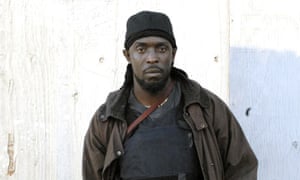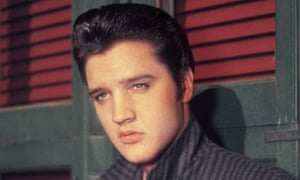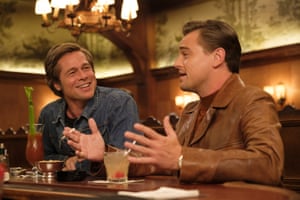
Omar Little is the gay stick-up man who robs drug dealers for a living in The Wire
Sam Delaney
Saturday 19 July 2008
 |
Michael K Williams as Omar Little in The Wire.
Photograph: PR
|
Barack Obama recently named Omar Little as his favourite character in his favourite show. "That's not an endorsement," the presidential hopeful added carefully. "He's not my favourite person but he's a fascinating character." Barack was right. Of all the brilliantly drawn, authentically complex and relentlessly captivating characters in this show's sprawling cast, he is surely the most engaging.
Devotees of the Baltimore-set urban drama are as passionate and obsessive as the sort of crazies who turn up to Star Trek conventions dressed as Lieutenant Uhura. And once they start setting up conventions in honour of The Wire you can be sure that most fans will turn up dressed in a big long mac, carrying a double-barrelled shotgun just like their hero. He is loved because he is meaner, funnier, cooler and braver than any other character you've ever seen on TV. He is unpredictable, complicated and brilliantly strange. Amid all the the show's vicious drug dealers, corrupt politicians and compromised cops, Omar is the only figure who adheres to a strict, if perverse, moral code. He also has a way-cool facial scar. Put simply, Omar Little is the most unique character in the most unique television show of all time.
Midway through the third episode of The Wire, we catch our first glimpse of him. He sits by the side of the low-rise housing projects in a van - all scarred and scary. He tugs insolently on a cigarette while he scopes out the young drug hoppers going about their business. The camera dwells on his narrowed eyes as he plots his next move with sinister, methodical calm. You're not quite sure who he is or what he's up to, but you're instantly engrossed.
 "They originally said seven episodes and you're out of here," says Michael K Williams, the man who plays him, "but after the first few weeks filming, David Simon and Ed Burns [the shows creators] came up to me on set and said they loved the passion I was bringing to it. They said they wanted to expand the role and told me to go and watch The Wild Bunch. They'd based a lot of the character on those old westerns." His croaking drawl is just like Omar's but the stuff he says isn't. Its strange to hear him self-deprecate, guffaw and use phrases like: "Dance was my first passion." Nevertheless, Williams' performances are heavily informed by his own eventful upbringing. "I grew up in East Flatbush in Brooklyn which was an intense neighbourhood filled with different West Indian cultures, he says. I never dealt drugs or went to jail but I was always getting myself in what I call knuckle-headed trouble. Jumping into situations I could have avoided. The gangsters knew who I was and left me alone.
"They originally said seven episodes and you're out of here," says Michael K Williams, the man who plays him, "but after the first few weeks filming, David Simon and Ed Burns [the shows creators] came up to me on set and said they loved the passion I was bringing to it. They said they wanted to expand the role and told me to go and watch The Wild Bunch. They'd based a lot of the character on those old westerns." His croaking drawl is just like Omar's but the stuff he says isn't. Its strange to hear him self-deprecate, guffaw and use phrases like: "Dance was my first passion." Nevertheless, Williams' performances are heavily informed by his own eventful upbringing. "I grew up in East Flatbush in Brooklyn which was an intense neighbourhood filled with different West Indian cultures, he says. I never dealt drugs or went to jail but I was always getting myself in what I call knuckle-headed trouble. Jumping into situations I could have avoided. The gangsters knew who I was and left me alone.

On the night of his 25th birthday he got involved in a bar brawl in which he was slashed across the face with a razor, leaving him with that distinctive scar. "Me and two friends were jumped," he says. "I didn't have time to worry about myself because my friend was cut even worse. He passed out and was losing blood fast so I had to get him to hospital before he died. But not all of Williams' life played like an episode of The Wire. For much of the 1990s, he worked as a professional dancer with the likes of Crystal Waters, Technotronic and CC Peniston. "I got paid to travel the world doing what I loved for seven years," he says. But in the end age caught up with me. His striking looks attracted the interest of casting directors and the odd acting job arose. He trained at drama college and was soon cast in Bringing Out The Dead, during which Martin Scorsese told him he was a damned fine actor.
Then things slowed down for a few years. He was working at his mothers daycare centre to make ends meet when he received a script from The Wires producers. "I read the character and thought, This looks like fun," he says. "I quickly decided that I didn't want to play this guy like an alpha male. I wanted to play him with sensitivity and integrity. He wouldn't scream or shout or get respect by intimidating people."
Compared to most of the violent street kids caught up in The Wires drug game, Omar cuts an almost Wildean figure. He swaggers through the streets of Baltimore like a gun-toting dandy in his long coat and fancy headscarves. He is poetic, lacing his dialogue with old-fashioned, incongruous phrases like "indeed", "do tell" and "I think not". He is a mine of insight and wisdom on the ugly, broken world he lives in. "Out there it's play or get played," he observes. When he robs an illicit card game, psychotic drug lord Marlo Stanfield fixes him with an evil glare and hisses, "Thats my money." Omar just smirks and explains, "Money ain't got no owners, only spenders." "Everyone knows who Omar is," says Williams. "He makes no excuses for what he is. He is not duplicitous in any way. That's not only rare in the show but in real life, too."
Omar's ethical code is endearing if often eccentric. He robs a shopkeeper of his drug stash - then pays him for a packet of cigarettes, taking care to check he's given the correct change. He rarely loses his temper and never swears. "It was Ed [Burns] who first suggested that Omar should prize his own self-control in a way that so many other characters in The Wire do not," David Simon has said.
Omar's defining scene comes in season two when he appears in court to testify against a gang member accused of murder. He waltzes into the courtroom ostentatiously toying with the tie he has casually looped around his neck for the occasion. "What exactly do you do for a living?" asks the state's attorney once he's taken the stand. "I robs drug dealers," he grins proudly. She asks how someone in his line of work could stay alive for so long. "Day at a time I suppose," he shrugs. Then comes his cross examination at the hands of corrupt gang-lawyer Maurice Levy. "You are amoral are you not? You are feeding off the violence and the despair of the drug trade. You are stealing from those who themselves are stealing the lifeblood from our city. You are a parasite who leeches off the culture of drugs..." Omar interrupts him: "Just like you, man." The lawyer stops in his tracks and splutters, "Excuse me? What?" Omar leans forward. "I got the shotgun, you got the briefcase. Its all in the game though, right?"

It's one of Williams' favourite scenes. "That was the moment I felt I'd finally got the character right," he says. "I'd spent a long time on the streets of Baltimore going deep into that world. I would be out after 2am, seeing fights, hearing shots fired. I needed to learn the details of how they walked, how they spoke. Baltimore is different to Brooklyn."
Williams also got to spend time with Donnie Andrews, a real-life former stick-up man on whom the character was partly based. He appears in season four as one of the henchmen who protect Omar in prison, and again in season five. "I never asked Donnie about his past," says Williams. "But there was a quiet menace to him that I was just able to absorb while he was on set."
Sometimes, aside from all the authentic touches, Omar just does weird shit. Like when he saunters to the cornershop in his silk pyjamas to buy Honey Nut Cheerios. Or the way he whistles that spooky tune everywhere he goes. "It's The Farmer In The Yard," Williams says. "The writers told me to whistle it. It makes me feel like Elmer Fudd. I walk into those scenes thinking to myself Its wabbit season!"
Brilliantly, Omar's sexuality is neither here nor there to most of the plot lines. But it is relevant to the overall picture. David Simon explains: "I thought Omar, as an unaffiliated character, could be boldly and openly homosexual in a way that a gay man within the organised drug trade or within the police department could not be." Williams saw Omar's sexuality as the thing most likely to make it a stand-out role. "The way I decided to play it was, So what?" he says. "Yeah, he's gay, but that's not the thing you're gonna remember him for if you meet him down an alley. It's that shotgun that will have you worried, not his gayness. I didn't want it to define him." Now, he hopes, the character is helping to change attitudes. "In the hood, especially among the black community, homosexuality is taboo," he says. "But I get real gangsters coming up and saying, 'Omar's my man! I love Omar!' I think it might have made some people think differently about things."
In season five, Omar features in some of the show's most dramatic scenes ever. Those left with a sense of withdrawal once its all over can take some comfort from Michael K Williams growing presence on our screens. His Hollywood stock is rising, with recent appearances in The Incredible Hulk and Spike Lee's forthcoming war epic, Miracle At St Anna. But he will always be remembered for playing one of TV's greatest ever characters. Lately, hes even won his mother round. "The Wire was never her cup of tea," he says. "But then she read the Barack Obama quote and that changed her mind. I managed to introduce them and he called her mom. Shes so thrilled she might even watch an episode some day!"















































